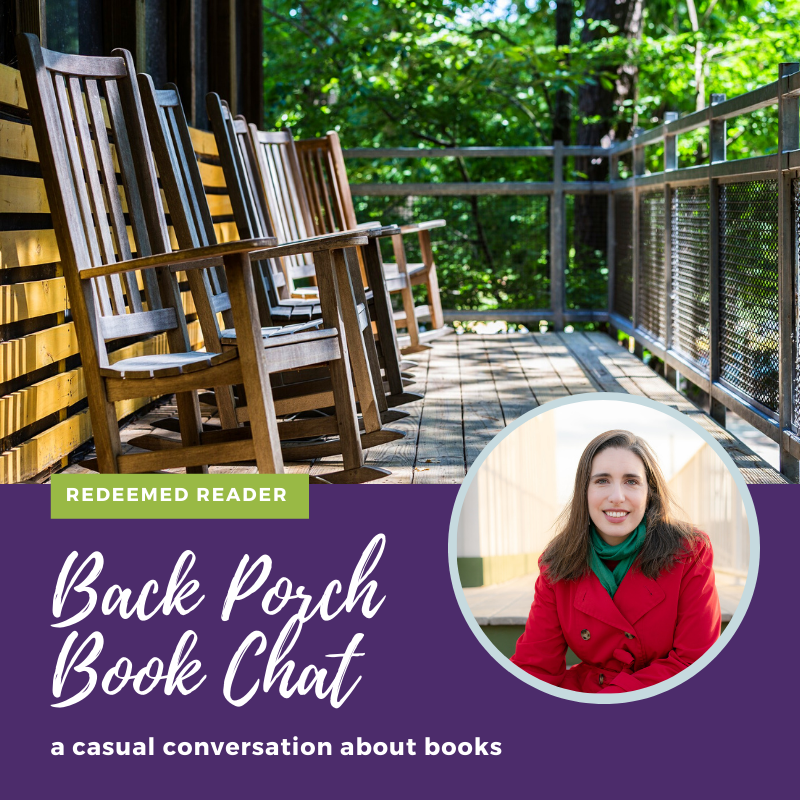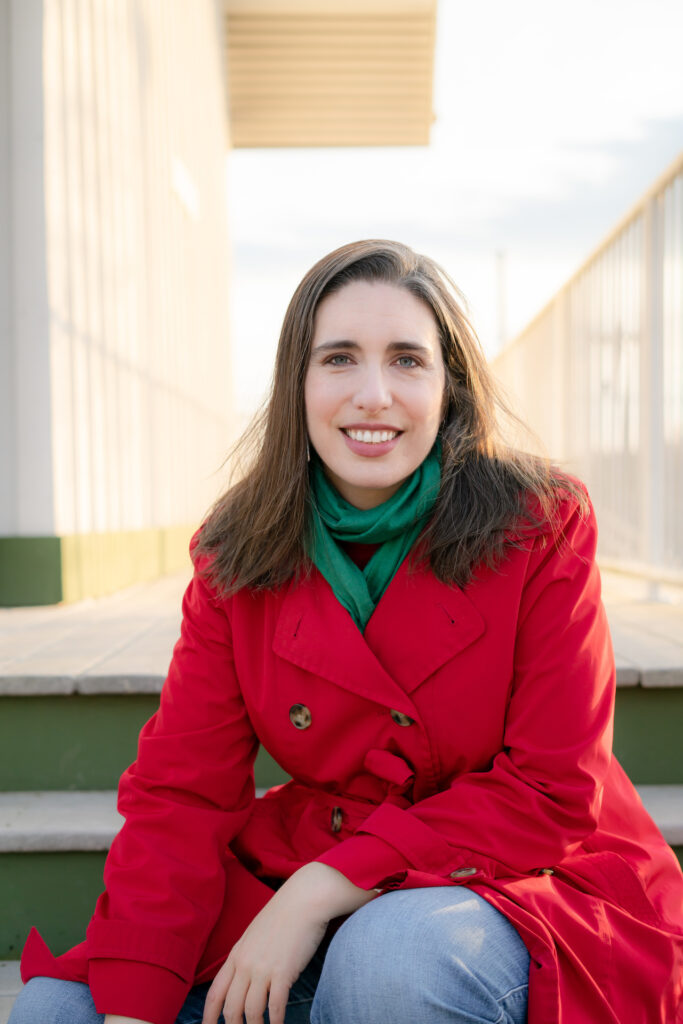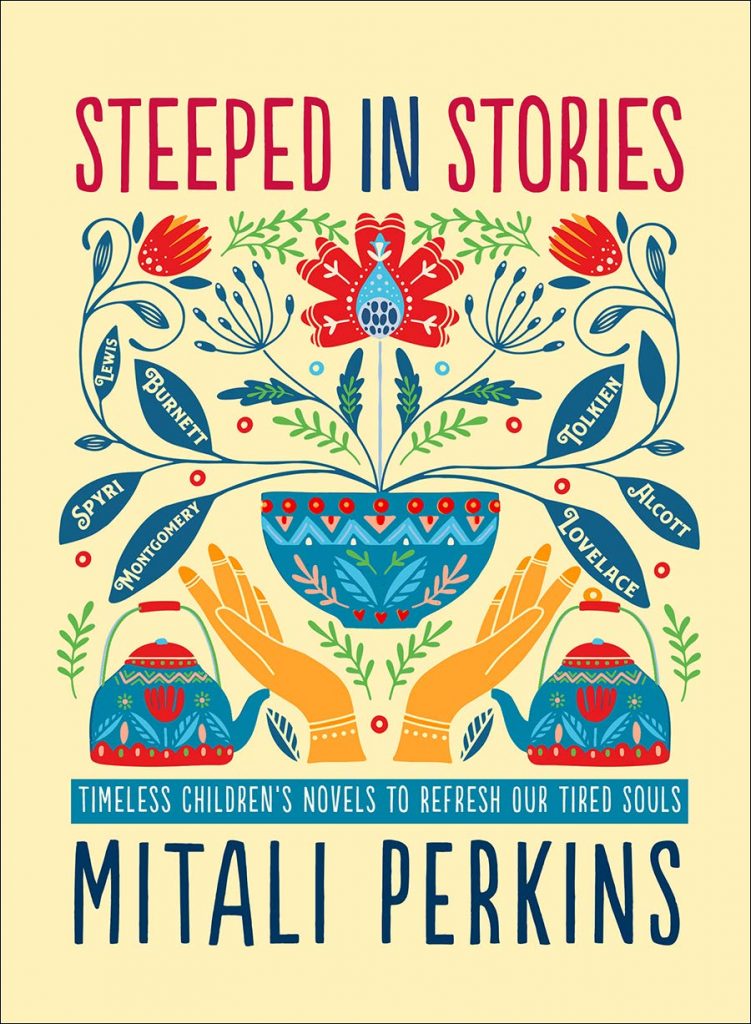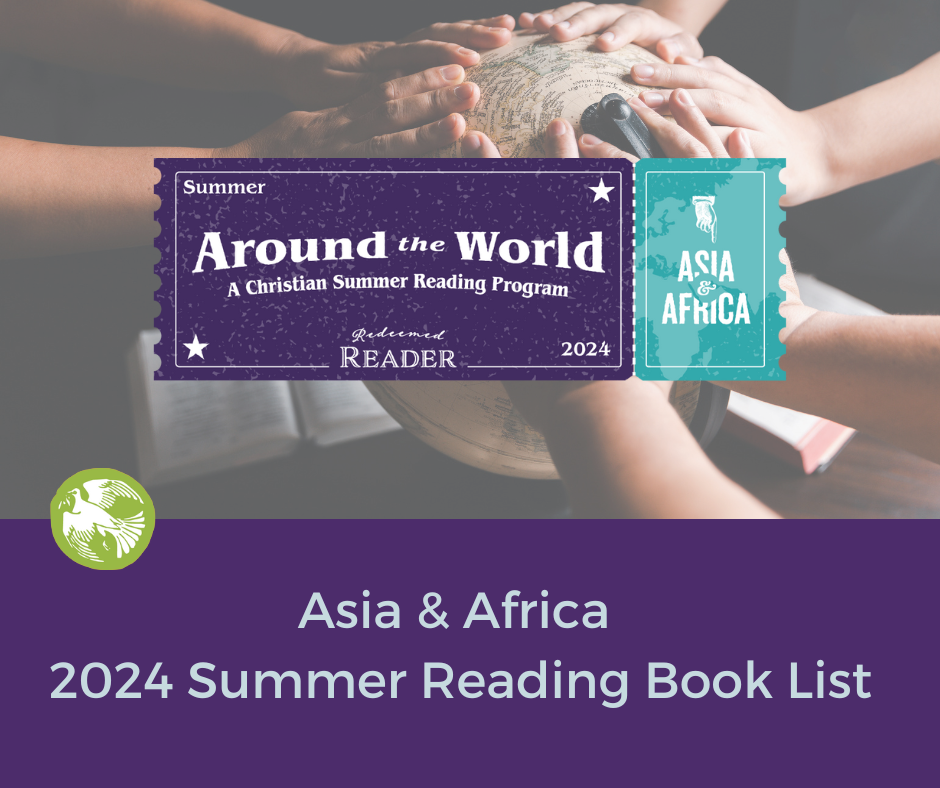Back Porch Book Chat: A casual, virtual conversation about books. Join us as we chat with book lovers like ourselves about a topic we all love! Our guest today is Carolyn Givens, CEO of Bandersnatch Books. She chats with us about reading, writing, and publishing books! Books are linked to RR reviews, where applicable. Interview conducted by Betsy.

Getting to Know Carolyn Givens
Before we begin, tell us what beverage you’d like as we sit in our (virtual) rocking chairs on this fall day: Hot cider? Tea? Coffee? Hot chocolate?
What time is it? Afternoon? I’m going to say it’s afternoon, so tea—actually, I’m going to pause typing right this moment and go make a cup…
<sounds of shuffling about the kitchen, pouring water in the kettle, the cat meowing for his water cup to be refilled, a clink of mugs, the noise of water molecules speeding up in the kettle before it comes to a boil, pouring of water into a mug with a teabag in it, a long pause as it steeps silently, fridge opening then closing again, then the creak of sitting back into the rocking chair>
Sorry, I should have done that before we started—do you have what you need? Oh, good. Back to your question: if it was morning, it would be more likely to be coffee, but right now, it’s decaf Stash Chai Spice with a splash of milk.
Your tea selection sounds lovely. And I had time to make my own cuppa.
Carrie, tell us a bit about yourself and what you do on a normal day. How do books and reading play into your everyday life, other than work-related concerns?

I live in Charlotte, North Carolina, with my cat, Lord Peter Wimsey—my official bio calls him a literary cat, but he’s honestly more interested in birds out the window than books. By day, I work at a large church as the communications manager, which means that if it goes on a screen or has words, it probably got touched by my team’s hands in its creation.
That takes up many of my days each week and I love being part of a church community that is motivated by a mission to help people find and follow Jesus.
I didn’t know you worked at a church, too! You wear a lot of hats!
By night—and weekends, and days off, and sometimes random Zoom meetings in mid-afternoon—I co-own and help run a small press publishing house, Bandersnatch Books. We publish treasures found off the beaten path for lovers of all that is Good, True, and Beautiful.
Books and reading are a huge part of my life—in both jobs, and also in my free time! I cycle through many genres and styles of books—I love middle grade novels and I love narrative nonfiction for grown-ups (even some of the harrowing ones!). I’ve been on a memoir and biography bent lately. Other times, I’m re-reading old favorites: Charlotte Brontë, Jane Austen, L. M. Montgomery, Laura Ingalls Wilder, M. M. Kaye, Ellis Peters, Gordon Korman, Robin McKinley (this list could go on, I’ll stop). And sometimes I’m discovering new novels. In submission season, I’m pretty much only reading manuscripts!
I had a friend say to me today, “Are you ever not reading or listening to a book?” The truth is yes, there are definitely ebbs and flows in my reading. Sometimes I’m just tired of reading, and I want to take in stories in another way, so I turn to movies or TV shows. But a lot of the time, I’ve got a book going either in paper version, digital, or audio. My favorite pastime is consuming stories, in whatever form I find them.
That last line about consuming stories sums me up, too. In fact, if the TV is on, but it’s only streaming someone’s random YouTube effort (because someone else in the family is Keeper of the Remote at the time), I’ve been known to request that we at least watch “something with a plot.”
Reading in the Midst of Real Life
What books have you most enjoyed this past year?

Well, on my memoir and biography kick, I read Mitali Perkins’ Steeped in Stories, and so deeply appreciated her perspective on classic books I grew up loving. I read Mitali’s Forward Me Back to You in the winter and was delighted by her storytelling, her outlook on the world, and her writing.
I also read Philip Yancey’s memoir Where the Light Fell last month and it knocked my socks off. I finished it so deeply grateful for the grace of God in one man’s life and how that grace has flowed through him to so many others.
The Many Assassinations of Samir, the Seller of Dreams by Daniel Nayeri was so much fun. I read Daniel’s Everything Sad is Untrue a few years ago and finished it with such deep gratitude to him for sharing his story, even as tears rolled down my face and I just wanted to wrap young Khosrou in my arms and hold him. Samir is an entirely different type of story, but Daniel has an ability to weave deep truth in with his narratives that strikes the same no matter what I’ve read.
And I read A Place to Hang the Moon by Kate Albus last spring and I don’t know when I’ve loved characters so very much and wanted so much good for every single one—even the antagonists.
I feel like this is getting long, so just one more note: two of my favorite things I’ve read this year aren’t yet available, but they will be! One is a middle grade novel in verse called Mari in the Margins by Rebecca J. Gomez, which Bandersnatch Books is going to publish in May 2024. I’m not a poet, and I have NO idea how Becky managed to tell a novel-sized story in the fewest words possible, but I’m so glad she did and so glad I get to be part of sharing it with the world.
And the last one(s)—I’m very good at stretching this out—are two mysteries for grown-ups by Katherine Ladny Mitchell, the start of a series that we’ll begin releasing in 2025 and 2026. It’s a long way away, but these are delightful cozy mysteries set in the modern day, and I could not love Katie’s writing style more.
Oh, we’re anxious to see those last ones! Hayley has a great “cozy reads” list for teens and adults, many of which are mysteries. And it’s no secret that we love Mitali Perkins and Daniel Nayeri, both!
Carolyn Givens and The Warren and the World
Let’s dive into some of your professional interests: you write the newsletter for Story Warren, don’t you? How did you get started doing that? Can you tell us a bit about Story Warren?
Yes! I do write the Warren & the World newsletter. In fact, I just finished writing this week’s before we began chatting. Let me start with the “bit about Story Warren” and then get into the how I got started because the latter is circuitous and I don’t want people to miss the important stuff:
Story Warren is a website for families who want to foster holy imagination in the kids in their lives. There are posts for those needing a little encouragement in that goal and then there are reviews of books and the like that can be good resources along the way. Story Warren was started by S. D. Smith, who writes the Green Ember series. The newsletter is a weekly rundown of what was happened around the Warren as well as a collection of other pieces around the web that do what we’re aiming to do! I regularly highlight Redeemed Reader reviews in there—so thank you!
And thank YOU for regularly highlighting RR reviews! (Readers, you can sign up for the newsletter on their website; I read it weekly.)
I met Sam (that’s S. D.’s name) and his wife Gina, as well as James D. Witmer and his wife Julie (James is now the managing editor of Story Warren) in the Nashville airport when my flight was canceled on my way home from my very first Hutchmoot (The Rabbit Room’s annual conference) in 2012. I was standing in line to rebook my flight, and I looked down the concourse and saw Sam all the way down at a food court. I recognized him from seeing him that weekend at the conference—he was distinctive, with not only a bald head and glasses but also a baby in a carrier—and I thought to myself, “Ooh! There are people from the conference here who I could hang out with before my new flight.” So I made my way toward them after getting my flight, and we wound up eating dinner together before they all took off on the same plane.
That dinner quite literally changed my life: I talked with two women who lived here in Charlotte, and 18 months later, they connected me to the job I now have at my church—which moved me down here. I met Sam and James, who have both been big encouragers in my journey as a writer and as a publisher. And I met other friends who have remained such to this day.
I wrote for Story Warren a couple of times over the next few years, and after I moved to Charlotte, my church hosted the first Inkwell, a creativity conference that Story Warren created for families. I helped out running that conference, and afterward, Sam and his brother Josiah and brother-in-law Andrew asked if I’d be interested in volunteering to do the newsletter, and the rest is history. I’ve been writing the Warren & the World since about 2014, I think.
That’s quite a legacy—10 years next year! Hayley writes our newsletter, and I am so thankful for that work. I know you’re a blessing to Story Warren.
Bandersnatch Books: Its Beginnings
You’ve started a publishing business recently: Bandersnatch Books. Congratulations! (Readers, I was one of the Kickstarter supporters for Rosefire, which we’ll get to in a minute.) Tell us how you went about that: you had an idea and then what? Where did the name come from? What’s involved in starting and running your own publishing business? How does it differ from publishing a book independently (the old “self-published” idea)?
Yeah, we started Bandersnatch Books in 2020, launched the Kickstarter for Rosefire in January 2021, and released it as our first title in July of that same year. (And THANK YOU for backing that Kickstarter! You helped us launch our company!)
But to back up a little bit, I began Bandersnatch Books with two of my dear friends, Rachel Donahue and Annie Beth Donahue. We’d been in a writing group together that we organized around the principles Diana Glyer lays out in Bandersnatch, her examination of how the Inklings influenced one another. She got the title out of a statement Lewis once said, which was, “No one ever influenced Tolkien. You might as well try to influence a Bandersnatch.” The Bandersnatch, originally, is a fantastic creature Lewis Carrol invented for his Jabberwocky poem in Through the Looking Glass and What Alice Found There.
We like to claim both sources—since our writing group used Diana’s book, we called ourselves the Band of Bandersnatches, and when we decided to move into publishing, the original source also fit because we were looking for books off the beaten path.
I love it! I’ve been meaning to read the book Bandersnatch. My kids and I regularly break out into Jabberwocky recitations.
We had the idea for the company because all three of us had books that were about ready for publication. We first started talking about perhaps all self-publishing and just supporting and promoting each other to our different networks, but then we realized that the three of us had skills that were particularly useful in the publishing process: editing, layout, design, printing, marketing, etc. We wondered if we could help other authors who were in a similar boat to us: with a book worth publishing but without the skills or energy to do it alone.
And so Bandersnatch Books came to be out of that. Seeing a need for good books to have a slightly larger audience than self-publishing alone and having the skills to help make that a reality.
We function as a traditional publisher in that authors don’t have to pay to publish with us. We pay royalties on sales of the books, and we are the primary driver for marketing and distribution. Authors are a part of it, too, of course, but it’s not all resting on their shoulders like it would be if they self-published.
That makes sense! The marketing/retail part is a huge strain on a solo author.
Bandersnatch Books: How It Works Now
How do you choose which books to publish? Do authors seek you out, or do you cultivate a list of “go to” authors you’d like to publish? Do you have in-house editors, or do you ask authors to go through that process on their own first?
It’s a little bit of everything, actually! We started with our own books because we figured we could learn and make mistakes with our own work before we messed up anyone else’s. And then the first few books we published after that were people we already had connections with—I’d done a freelance edit for J. A. Sommer’s Zao’s Tales a year or so earlier, and we reached out to him about publishing with us instead of self-publishing. Why Does Mommy Say No?! was written by a friend of Annie Beth’s and she pitched it to us. Loren G. Warnemuende is my sister, and Rachel had been a beta reader for her Daughter of Arden trilogy and wanted to publish them.
And then, we also opened for submissions. Of course, because we are small, we get submissions from people we know already but also from people we don’t know. A good number of our authors heard about us secondhand or had a friend say, “You should submit this to Bandersnatch.”
We have in-house editors (who are we kidding—it’s mostly us), but we do appreciate the author getting the manuscript in as polished a form as possible before submitting. That will give the manuscript the best chance to shine. Once we pick something up, we may have a few conversations with the author about it and then pass it back to them for one last shaping and polish before we begin working with them on it. We work through developmental edits—shaping the story so that it flows well and the pacing is good—and then move into copy edits and line editing—making sure every sentence sings and also that the commas are in the right places.
Hooray for the editing process! That’s my favorite part. I’m a far better editor than I am creative writer.
What’s been your biggest challenge in running and maintaining a small, indie press?
I think the biggest challenge is balance. We want to grow, and we want to give our authors the best possible chance for success, but all three of us owners have lives and jobs outside of Bandersnatch.
Rachel homeschools two of her kids and has two others in a local school. Annie Beth has four kids in high school and college—and she homeschools the ones still at home. They are sisters-in-law, and both also work for the family greenhouse business. And then there’s volunteering, church ministry, etc., on top of everything else.
We love Bandersnatch, and we want to do everything we can to make it grow, but we are limited in our capacity—so finding that balance has been a challenge. We do have some folks who have volunteered for us, and that’s been a huge help. Sam Morgan reached out last spring and offered his available time to help out and is now serving as an editorial assistant on our team. Melissa Woodruff met us at a homeschool convention, realized she didn’t live too far away, and came to one of our biggest in-person events this fall to help run the booth for three days. We’ve had high schoolers and college students come on as summer interns. It’s so encouraging to see people want to help make our dream a reality with us.
We’re right there with you; all of the RR team have significant life/family/church commitments outside our work for Redeemed Reader. Balance is key, and something we’re constantly discussing and praying about.
Carolyn Givens’s Books
Let’s switch gears to YOUR personal work as an author. You’ve written two books to date, if I’m remembering correctly: Rosefire and The King’s Messenger. Rosefire was the first book Bandersnatch published, but you actually wrote The King’s Messenger first, right? Was The King’s Messenger independently published first? How did you first get started writing books? Do you have a writer’s group or some sort of community support network for your writing?
Yes! I actually began The King’s Messenger in college—the idea of Smuggins, a messenger for the King who was never called on, came to me in a Great Christian Writer’s course as we studied Milton’s sonnet, “On His Blindness.” That was 21 years ago! I wrote that book chapter by chapter—really as short stories originally—over the course of about a decade. I think I wrote the last one in about 2010 or 2011. I like to say that The King’s Messenger is allegor-ish or that it’s a parable. Smuggins is a messenger for the King, and in every adventure he has, he learns more about the King’s character and what it means to serve the King well. Almost every single chapter came out of something I was learning in my own walk with God. At some point along the way, I realized the stories could be chapters of a whole, and then in the editing process, I went back in and shaped them to fit together a bit more.
That is one of my ALL-TIME FAVORITE sonnets. The all caps are justified, readers; I’ve taught high school British lit for years and have read plenty of sonnets in my day.
I self-published The King’s Messenger in 2017 and did a lot of learning about the self-publishing process along the way. When we launched Bandersnatch, we decided to re-release it, so we reformatted and made a couple of edits, and it came out as a second edition in 2022.
I’ve told stories since before I could write, and I’ve written them since I knew how. We spent a summer in Alaska and the Yukon after I was in first grade, and I wrote stories of a girl and her dog going on a plane to Alaska—no idea why there was a dog in those stories, I never had one.
I’ve often had friends who wrote as well, but until I was working on Smuggins, I didn’t do a ton of sharing of my stories. I called them The Smuggins Stories for the longest time, and I’d read them with friends and especially with kids and get feedback on them. Then when I was working on Rosefire, my friend Christine asked me to read chapters aloud to her. Having someone to share my stories with is one of the biggest motivators to me to keep working on them.
And then, as I mentioned, Rachel and Annie Beth have been part of a writing community for me. Our writers’ group went by the wayside for many reasons, but we’re working on carving out more time in the coming couple of years for each of us to work on our own writing and not just on Bandersnatch stuff.
The blurb on Bandersnatch describes Rosefire as a “story of friendship, redemption, and sacrifice.” I’d agree with that! I found the differing perspectives in the story intriguing. (Readers, the first portion of the novel is narrated by a particular character. Part 2 switches to a diary by a different character. Part 3 reverts back to the original narrator). Why did you choose that narrative structure for this story? Was it difficult to switch gears? What did that structure allow you to do as an author that a more traditional narrative structure wouldn’t offer?
When I was early on in working on Rosefire, I was thinking I’d write a trilogy (all fantasy authors want to write trilogies, I think), but I realized fairly quickly that the story I had wasn’t as complex as it would need to be for a trilogy, so I winnowed my expectations down to three parts. I wanted to explore two main things as a writer and storyteller: voice and perspective.
There are authors who are amazing at developing a very distinct narrative voice and can even do it in a third-person point of view (POV). I wanted to play with it in first-person POV. My main narrator, Karan, is written in my most comfortable narrative voice. It’s nuanced to her character, but I bet if you read other things I’ve written, you’d be able to say, “Oh, yeah, I can hear the similarities.” The journal entries from Part 2 shift to a different first-person perspective, Brother Ezra’s, and (hopefully) a distinct narrative voice.
I really liked Brother Ezra’s portion, and yes, I’d say it’s a distinct narrative voice! Part of that is the format you give his entries, and part of that, I think, is his “voice.”
In addition to the writerly exercise of playing with narrative voice, having two different POVs gives you the opportunity to expand the story and the reader’s understanding of what is true. Any first-person narrator is inherently unreliable, because while she may be telling you the truth, she’s only telling you her perspective on it. In Rosefire, bringing in the journal entries and a second narrative voice allowed me to provide perspective on the events of the story that my own narrator, Karan, was unaware of. Additionally, because Brother Ezra is much older than Karan, he fills in historical knowledge that she’s missing.
The other thing I was playing with in the narration was the idea that time gives different perspectives. Karan is writing the story from a point in time when it is complete. So, even in her own narration she has a perspective different than the one she would have had when the events were happening. As the collector of the story (she is the one who has selected which of Brother Ezra’s journal entries to give us), she has a global perspective that sneaks into her first-person narration.
That was all a lot of geeky writerly stuff, but hopefully it was fun for someone to read!
We love geeky writerly stuff around here! Readers, I’m not sure when I’ll get around to an “official” review of Rosefire, but I knew I wanted to interview Carolyn (mission accomplished!). It’s a lovely story.
I know your sister, Loren Warnemuende, whom we’re interviewing this month for our print magazine, based her trilogy on a fairy tale. Did you have any particular inspiration for this story?
I did! In that same Great Christian Writer’s course where I met Smuggins, I read T. S. Eliot’s Four Quartets for the first time. The very first image of Rosefire came from a line in “Little Gidding”: “Ash on an old man’s sleeve./ Is all the ash the burnt roses leave.” I saw an old monk shaking ash off of his sleeve after a pile of roses was consumed, and I thought, “Who is he, and what is the story he’s living in?”
Four Quartets is the thematic parent to Rosefire. There are images throughout from the poem, and themes of the rhythms of time, of love and sacrifice are woven through. Right toward the end of Four Quartets is the wonderful line, “We shall not cease from exploration/ And the end of all our exploring/ Will be to arrive where we started/ And know the place for the first time.” That could, perhaps, be the synopsis of Karan’s story, too.
OK, I may need to reread Rosefire next semester. My book club is going to read The Four Quartets for our January meeting, and I’ve never read it before….
Interestingly, I’ve gotten a lot of questions about whether I based Rosefire on George MacDonald’s The Princess and Curdie. I hadn’t actually read that book when I wrote Rosefire, so no—but in my research, it appears Eliot was a MacDonald reader, so it’s likely I came by the concept of rosefire from MacDonald via Eliot.
I actually did wonder that very thing! George MacDonald is not only one of my favorite authors, but I did quite a bit of research and study on that particular book for my bachelor’s and masters theses. If you haven’t yet read The Princess and Curdie, you’ll have to report back when you do.
Do you have any more books planned that relate to the kingdom of Asael? Any other books up your sleeve that you’re working on?
I have actually started a sequel of sorts! (I get nervous saying that because I’m such a slow writer that I don’t want to get anyone’s hopes up!) It’s set about 15 years later, and is from the perspective of Edmund—one of my favorite secondary characters in Rosefire. I expect it will be a few years at least before it’s ready for an audience, but I’m excited about what it’s beginning to shape into.
Writerly Advice from Carolyn
What advice do you have for young, aspiring authors who want to both write better and also someday get published? Are there any books you’d recommend to our audience, either about the craft of writing or that are simply great reads?
I’d encourage young writers to write, but not to worry about publishing yet. Take your time. Grow as a writer. Grow in your craft. There is no urgency to have a published book in the world, and you don’t want to look back at something you published before it was ready and later regret putting it out into the world.
Work on writing, find other young writers to collaborate with. The Habit Online Writer’s Community has a youth cohort—two of my nieces are in it, and they’re creating fantastic stuff and having a blast trying things. Last summer, they and a few other writer friends all took their characters and put them together into one story and then co-wrote it in a Google doc so they could practice how their characters would respond when thrown into situations not of their own creation. They told me about that, and I thought it was the coolest exercise!
If a painter’s tools are their brushes and paints, a writer’s tools are the words they wield—so it’s important to love words as a writer. Love the very sound and spelling of words. Love their quirky meanings. You can look words up online, sure—and there are some good reasons why an online dictionary like Merriam-Webster online is particularly valuable (pronunciation guides! More space for examples!), but I always encourage young writers to get a paper dictionary so that you can discover the words on either side of the one you’re looking for, or so that you can marvel that the definitions for “run” take up nearly two full columns of space.
I’m terrible at recommending writing books, so I’ll just point you to The Habit—there’s a weekly email, and a podcast, and some free courses—and then there’s the online community which is a subscription. Speaking of podcasts, I’ll also mention Withywindle, which is my absolute fave—they interview authors, talk about words, tell bad jokes, and more.
We often recommend Jonathan’s Creative Writing Courses and The Habit, both! And The Habit newsletter is another one of the (few) that I read weekly.
But for books you should read—in my list of go-to re-reads above, I listed Robin McKinley and Gordon Korman, and if you haven’t read them, you must. Especially Robin McKinley’s The Blue Sword and Beauty, and Gordon Korman’s MacDonald Hall series (also called Bruno & Boots series) and Swindle series. They are totally different from each other, and are two of my all-time favorite authors for the upper elementary into early high school years.
Those are such great suggestions. Thank you, Carolyn, for taking the time to “chat” with us!
You can read the rest of our Back Porch Book Chats here (our guests have been authors like Carolyn, bookstore owners, teachers, and more).
Carolyn Clare Givens is a displaced Northerner exploring the foreign ways of the South. She works in communications at New City Church in North Carolina, handling much of the stuff that goes on screens or paper (or signs, or t-shirts, or pens, or mugs…). Carrie lives in Charlotte with her literary cat, Lord Peter Wimsey. She has previously bumped around the world, both as a missionary kid and adult. Carrie was part of the publishing process on more than 30 books before launching Bandersnatch. She’s the author of Rosefire, published by Bandersnatch Books in 2021, and The King’s Messenger, released as a new edition by Bandersnatch in 2022.
Stay Up to Date!
Get the information you need to make wise choices about books for your children and teens.
Our weekly newsletter includes our latest reviews, related links from around the web, a featured book list, book trivia, and more. We never sell your information. You may unsubscribe at any time.
Support our writers and help keep Redeemed Reader ad-free by joining the Redeemed Reader Fellowship.
Stay Up to Date!
Get the information you need to make wise choices about books for your children and teens.
Our weekly newsletter includes our latest reviews, related links from around the web, a featured book list, book trivia, and more. We never sell your information. You may unsubscribe at any time.
We'd love to hear from you!
Our comments are now limited to our members (both Silver and Golden Key). Members, you just need to log in with your normal log-in credentials!
Not a member yet? You can join the Silver Key ($2.99/month) for a free 2-week trial. Cancel at any time. Find out more about membership here.



